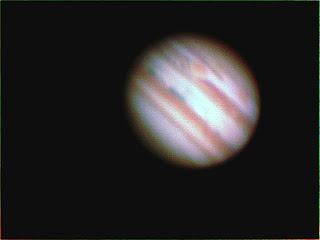Here are a couple of images I took of yet another close conjunction between the moon and Jupiter. These are heavily-cropped images taken with a digital SLR with an image-stabilized zoom lens at 135mm.
The trials, tribulations and small triumphs of a Charlotte, NC astronomer imaging under Bortle 8/9 skies.
Wednesday, January 30, 2013
Thursday, January 17, 2013
The Sun on January 17, 2013
The sun continues to be very active, which makes from some interesting H-Alpha images. Today's images were captured with a PST/SolarMaxII combo. Each capture was 1000 frames at 640x480, with the best 20% of the frames stacked and processed. I was less aggressive with the wavelets in Registax in this set of images, so they look a little more "natural" than those I posted yesterday.
Wednesday, January 16, 2013
An Active Sun--January 16, 2013
The sun is very active today. These images show prominences and active regions. The active region clearly visible on the first image is AR1561, which has gown rapidly and is visible to the naked eye. It is capable of producing X-Class flares. Captured with PST and SolarMaxII.
Tuesday, January 15, 2013
Jupiter Images January 14, 2013
Thanks to the great advice from the unconventional imaging group on Yahoo, I've achieved a significant increase in the quality of my images of Jupiter. I captured 1000 images for each pic here, and stacked and processed the best 200 frames from each. Initial processing was done in Registax. I used Focus Magic to tweak the focus and did the final finish work in Photoshop. Note the Galilean moon, Europa (the red dot to the right), and its shadow on the top right of the disk.
 |
| Jupiter after processing. Note the shadow of the moon on the disk (upper right) |
 |
| This is same image as the one above, but with additional unsharp mask processing |
Sunday, January 13, 2013
Control an ETX or LX200 from Stellarium
Here are 2 short videos I made on how to control a Meade telescope from Stellarium. I am using an ETX in this demo, but I also use Stellarium to drive the 14 inch. As you can see, it's simple, quick, and easy!
Video 1 deals with hardware, and video 2 with software setup.
Video 1 deals with hardware, and video 2 with software setup.
Saturday, January 12, 2013
New Jupiter Images 1-9-2013
Here are some images I took of Jupiter with the 14 inch in decidedly less-than-average seeing. They are a long way short of what I would like to see, and I've used different variations to process them. Captured at 640x480 with a Microsoft LifeCam with 1000 frames per capture. Stacked and processed in Registax 6, with final processing in Photoshop. The big challenge in poor seeing is ability to reach focus. For comparison, look at the images of Saturn taken with my ETX 125 at Cape Cod last summer. The atmosphere at Cape Cod had long, slow ripples with long periods of steadiness, greatly simplifying focus. In these pix, Jupiter's image was rippling as if it was viewed through rapidly rippling water.
Nevertheless, the Great Red Spot (GRS) is clearly visible in these images, with an area of turbulence next to it. The images were captured over an hour and the motion of the GRS is clearly visible between the first and second image.
Nevertheless, the Great Red Spot (GRS) is clearly visible in these images, with an area of turbulence next to it. The images were captured over an hour and the motion of the GRS is clearly visible between the first and second image.
 |
| Output from Photoshop. Note GRS |
 |
| Note the position of the GRS compared to the fist image |
.jpg) |
| Output from Registax after stacking and wavelet processing. |
 |
| Output with minimal Photoshop processing (after Registax) |
Subscribe to:
Comments (Atom)
M42--12 hours with the Dwarf 3 scope
The Dwarf 3 is the perfect scope to capture detailed, wide views of the sky. This ability is particularly suited to large DSOs like the Orio...

-
I had a couple of emails asking how to defork an ETX telescope. The ETX 90 and ETX 125 were optically superb scopes, but the mounts left a...
-
The ZEQ25 doing its stuff on a cold night--imaging the Orion Nebula with an 8 inch f/4 astrograph. Note the lovely Christmas rug :) As ...
-
One of the great things about being a part of an online community of people with similar interests is that you learn a lot from people who a...















